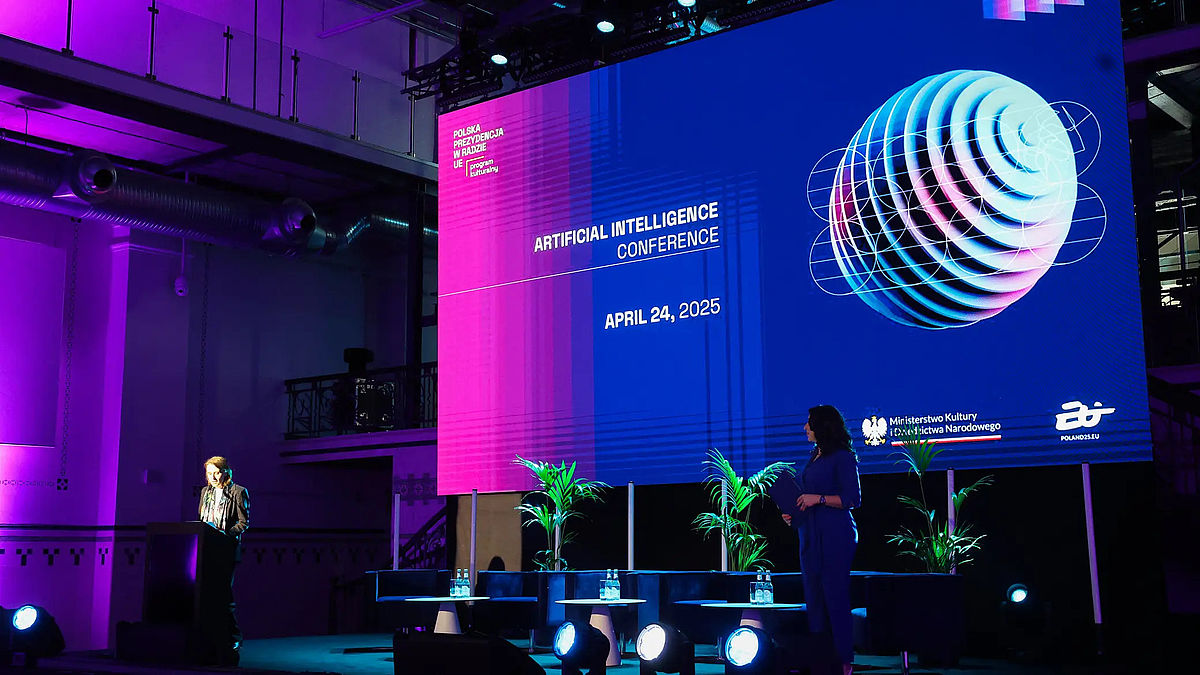This two-day conference brought together policymakers, academics, creators, industry representatives and institutions to explore the rapidly evolving impact of Generative AI on copyright, media, and the creative and cultural sectors. Discussions focused on both the promise and the risks posed by AI technologies, with particular attention to film and audiovisual works, and intellectual property frameworks in the EU and beyond.
The event opened on 24 April with welcome remarks by Hanna Wróblewska, Minister of Culture and National Heritage of the Republic of Poland, followed by keynote speeches from Sylvie Forbin (World Intellectual Property Organization – WIPO), Anna Herold (European Commission), and Professor Manuel Damásio (Universidade Lusófona).
The first joint panel of the conference – “AI in the Creative Sectors: A Breakthrough Solution or a Herald of Creativity’s Downfall?” – examined the impact of Generative AI on cultural and creative output. Moderated by Marta Materska-Samek (Jagiellonian University), it brought together Emmanuelle du Chalard (European Commission), Jacek Nagłowski (VN Lab), Jakub Marszałkowski (Indie Games Polska Foundation), and Justine Radel-Cormann (European Audiovisual Observatory).
The afternoon continued with a Copyright-focused panel on “The Use of AI in Audiovisual Works: Challenges and Opportunities”, moderated by Iga Bałos (Polish Screenwriters’ Guild). Speakers included Emilie Anthonis (Motion Picture Association), Michele Evangelista (European Broadcasting Union), Dariusz Jabłoński (European Producers Club), and Matt Subieta (Digital Author). The panel highlighted how AI tools are influencing film development, production, and rights attribution, while raising critical questions on the future of human authorship in storytelling.
The final session of the day – “AI in Newsrooms: How is AI Transforming the World of Contemporary Media and Journalism?” – was moderated by Karol Zgódka (Polish Ministry of Culture and National Heritage) and featured insights from Michał Szułdrzyński (Rzeczpospolita), Grégoire Polad (Association of Commercial Television and VOD Services in Europe – ACT), and Anders Kern Boje (Danish Broadcasting Corporation). The discussion covered the integration of AI tools into journalistic workflows, editorial integrity, and the evolving role of human journalists.
A networking dinner concluded Day 1, offering a chance for informal exchange among participants.
The second day opened on 25 April with a panel on “Countering Disinformation with the Help of Artificial Intelligence”, moderated by Sylwia Czubkowska. Panelists Wouter Gekiere (European Broadcasting Union), Anne Marie Pollock (Coimisiún na Meán), and Izabela Jarka (NASK) discussed how AI can be both a powerful tool and a complicating factor in fighting online disinformation.
Next came the Copyright Panel “AI in Intellectual Property Enforcement: Potential and Difficulties”, moderated by Harrie Temmink (EUIPO). Speakers included Antoine Aubert (EUIPO), Jose Ignacio Carrillo (La Liga), Piotr Wasilewski (TVN Warner Bros. Discovery), Jakub Kudła (Polish Press Publishers Chamber), and Melissa Morgia (IFPI). The discussion addressed how AI can support detection and enforcement efforts while raising new technical and legal challenges.
The afternoon resumed with “The Role of Media (and AI) Literacy in Empowering Citizens with Digital Skills”, moderated by Magda Jagiełłowicz (Ministry of Culture and National Heritage). The panel welcomed Paolo Cesarini (European Digital Media Observatory), Lucas Chevalier (CLEMI), Kuba Piwowar (Centrum Cyfrowe) and Jan Józefowski (TVP Poznań) for a timely discussion on the need to strengthen citizens’ critical thinking and technological awareness.
The final session of the conference focused on collective rights management and AI. “AI in Collective Management Organisations” was moderated by Krzysztof Wojciechowski (Copyright Commission), with contributions from Anita Huss-Ekerhult (IFRRO), Tobias Holzmüller (GEMA), Nick Yule (AEPO-ARTIS), Maciej Janik (ZAIKS), and Dominik Skoczek (SFP-ZAPA). The panellists explored how CMO practices are evolving in response to AI-generated content, and the broader implications for remuneration, metadata, and transparency.
UNIC warmly thanks the organisers and the Polish Ministry of Culture and National Heritage for the opportunity to engage in these important conversations. The event offered a valuable platform to exchange insights on the future of film, media, creativity, and copyright in an AI-driven age.
Read the Polish Presidency’s article on the event here.
